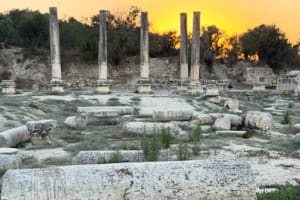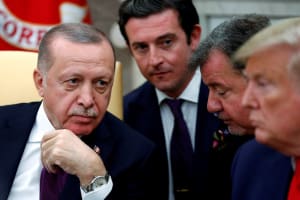Jordanian King: No country will agree to ‘run around Gaza on patrol with weapons’ without Hamas disarmament
Israel opposes official 'Blue helmet' UN mandate for int'l Gaza stabilization force

The ceasefire between Israel and Hamas remains, for now, apparently stuck in its first phase, as the terror group continues to hold 13 hostage bodies while violently reestablishing its control over the parts of the Gaza Strip not occupied by the IDF.
Meanwhile, discussions over the security arrangements in the case Hamas would, in fact, disarm and allow another force to take over the Gaza Strip, as stipulated by the ceasefire agreement, also appear to be going nowhere.
“Arab states will not enter Gaza and start clashing with a terrorist organization,” a source familiar with the discussions told the Jerusalem Post on Monday.
“They are willing to maintain calm, but not to carry out the operations Israel wants the force to perform,” the source stressed.
This was echoed by Jordan’s King Abdullah II in an interview with the BBC. He warned that Arab countries would agree to “keep” the peace in Gaza, once it had been established, but not to “enforce” it.
“What is the mandate of security forces inside of Gaza? And we hope that it is peacekeeping, because if it's peace enforcing, nobody will want to touch that,” the King said.
“Peacekeeping is that you're sitting there supporting the local police force, the Palestinians, which Jordan and Egypt are willing to train in large numbers, but that takes time. If we're running around Gaza on patrol with weapons, that's not a situation that any country would like to get involved in.”
According to the peace plan endorsed by U.S. President Donald Trump, a proposed International Stabilization Force (ISF) “will train and provide support to vetted Palestinian police forces in Gaza, and will consult with Jordan and Egypt who have extensive experience in this field,” and “work with Israel and Egypt to help secure border areas, along with newly trained Palestinian police forces.”
Despite his statements, which imply he doesn’t trust that Hamas and the other Gazan terror groups will disarm, the King said he thinks Hamas will not violate the ceasefire terms.
“I don't know them, but those that are working extremely close to them – Qatar and Egypt – feel very, very optimistic that they will abide by that,” he said.
“If we don't solve this problem, if we don't find a future for Israelis and Palestinians and a relationship between the Arab and Muslim world and Israel, we're doomed,” said King Abdullah.
Meanwhile, sources told the Jerusalem Post that the limits of the international force’s mandate and its official designation are subject to disputes between the countries that could send troops and Israel.
According to the UN’s definitions, the “enforcement” of peace allows military force, while “peacekeeping” missions can only use force to defend themselves or their mandate.
Israel would like to see a strong mandate that enables the force to actively combat terrorist remnants in Gaza.
Meanwhile, several states have been pushing for the United Nations to issue an official mandate outlining the ISF’s powers.
“On one hand, the US understands Israel’s position, but it also wants to move forward with the establishment of the force as quickly as possible,” a source told the Post.
“From the American perspective, setting up this force is crucial to the Trump plan – and it’s possible that at a later stage, the president will pressure Netanyahu to compromise.”
The Arab states reportedly want the mandate to be based on Chapters VI and VII of the UN Charter, making it an official UN force.
“This means the UN Blue helmets will be on the ground,” a source told the Post. However, Israel has had bad experiences with UN troops on its borders, as with UNIFIL in Lebanon. In addition, this would set the precedent of a UN force deploying to an Israeli–Palestinian conflict zone.
Israel, therefore, would prefer the ISF’s mandate be issued by a Security Council resolution approving its deployment and oversight.
The force’s makeup is another issue that is under discussion, as Israel opposes the participation of Turkish and Qatari troops, as well as the inclusion of Palestinians affiliated with the Palestinian Authority.
Other candidates to send soldiers reportedly include Azerbaijan, Indonesia, Pakistan, and others.
“In the end, Israel may have no choice and could be forced to agree to the inclusion of Palestinians who are not formally part of the PA in the force,” a source familiar with the matter told the Jerusalem Post.

The All Israel News Staff is a team of journalists in Israel.
You might also like to read this:














